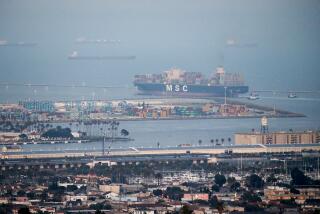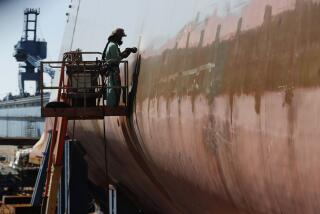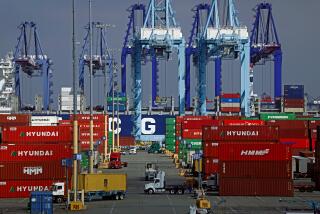For years, the world’s shipping industry has...
- Share via
For years, the world’s shipping industry has wrestled with the fundamental problem of too many ships chasing too few cargoes. The oversupply has led to spiraling freight rates and laid-up ships.
This week’s failure of Sanko Steamship Co. shifts the spotlight to Japan from Europe, which already has seen a string of shipping failures. Sanko’s move to seek protection from its creditors is the most spectacular failure so far.
According to London shipping analyst David Price of Drewry Shipping Consultants: “It’s going to hurt the reputation of the Japanese shipping industry in general.”
In Europe, some in the shipping business are reacting with glee to Sanko’s misfortunes.
One British shipping analyst, who asked not be identified, said: “A lot of people, not only in Britain, will be delighted to see what is happening.”
Japan, the world’s biggest shipbuilder, and South Korea long have been criticized by their competitors for allowing the world shipping fleet to expand during a period of crisis. Sanko in particular reacted to the overcapacity with a strategy that baffled and outraged its competitors: It embarked on a massive shipbuilding program, placing orders for 125 ships to modernize its fleet.
The strategy backfired. Sanko accumulated debts that banking sources in Tokyo put at $2.1 billion and this week became the largest business failure in Japanese history.
Roger Seymour, a director of Denholm Coates, the London ship broker, said: “I think we’re all just taking a deep gulp to see what will happen with Sanko. This is the biggest disaster in ship brokers’ lifetimes. The ramifications of it all are enormous.”
Of most immediate concern to the industry is what Sanko will do with its fleet of 244 ships, including 89 tankers, which represents about 4% of the world’s shipping tonnage.
Selling the ships to other owners is not an attractive option. According to an industry official in Hong Kong, “Second-hand values of ships have been coming down like a waterfall. We may soon reach a point where 10-year-old ships will not have a premium over scrap rates.”
Many experts blame the industry’s overcapacity on past aggressiveness by lenders. Now they see financiers becoming more cautious in the light of Sanko’s experience.
New York shipping analyst Sally Smith of Alex. Brown & Sons said, “It probably will make banks that much more nervous about shipping. The funds have already started to dry up, and it will be that much more difficult (to borrow).”
That, in turn, will affect Asia’s huge shipping industry. Already, big companies such as Hong Kong’s Jardine Matheson, which reported a heavy loss last year, are planning to withdraw from ship ownership entirely.
Jardine Chairman Simon Keswick said in March: “It is capital intensive, and we see no early end to conditions of oversupply.”
More to Read
Inside the business of entertainment
The Wide Shot brings you news, analysis and insights on everything from streaming wars to production — and what it all means for the future.
You may occasionally receive promotional content from the Los Angeles Times.










